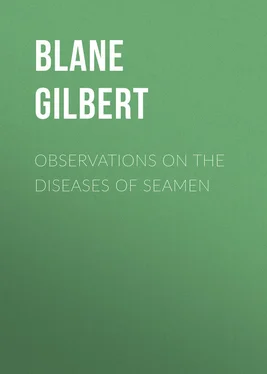Gilbert Blane - Observations on the Diseases of Seamen
Здесь есть возможность читать онлайн «Gilbert Blane - Observations on the Diseases of Seamen» — ознакомительный отрывок электронной книги совершенно бесплатно, а после прочтения отрывка купить полную версию. В некоторых случаях можно слушать аудио, скачать через торрент в формате fb2 и присутствует краткое содержание. Жанр: foreign_antique, foreign_prose, на английском языке. Описание произведения, (предисловие) а так же отзывы посетителей доступны на портале библиотеки ЛибКат.
- Название:Observations on the Diseases of Seamen
- Автор:
- Жанр:
- Год:неизвестен
- ISBN:нет данных
- Рейтинг книги:3 / 5. Голосов: 1
-
Избранное:Добавить в избранное
- Отзывы:
-
Ваша оценка:
- 60
- 1
- 2
- 3
- 4
- 5
Observations on the Diseases of Seamen: краткое содержание, описание и аннотация
Предлагаем к чтению аннотацию, описание, краткое содержание или предисловие (зависит от того, что написал сам автор книги «Observations on the Diseases of Seamen»). Если вы не нашли необходимую информацию о книге — напишите в комментариях, мы постараемся отыскать её.
Observations on the Diseases of Seamen — читать онлайн ознакомительный отрывок
Ниже представлен текст книги, разбитый по страницам. Система сохранения места последней прочитанной страницы, позволяет с удобством читать онлайн бесплатно книгу «Observations on the Diseases of Seamen», без необходимости каждый раз заново искать на чём Вы остановились. Поставьте закладку, и сможете в любой момент перейти на страницу, на которой закончили чтение.
Интервал:
Закладка:
When the fleet arrived at Barbadoes on the 23d of May, it was found that the number of sick on board amounted to sixteen hundred, and that there was not accommodation for more than two hundred at the hospital. As there was hardly any complaint but scurvy, the Admiral, at my representation, issued an order for serving the sick on board of their own ships with fruit and other vegetables and refreshments, such as milk and soft bread. This course of diet commenced in the beginning of June; and as the greater part of the fleet was near four weeks thereafter in port, they enjoyed the advantages of it during that time; and the very great diminution of sickness and mortality, which appears by the Tables in that month, sufficiently evinces the benefit derived from it. In less than four weeks the fleet, from being very sickly, became extremely healthy.
It was remarked, that the men recovered faster on board than on shore; and it would appear that land air, merely as such, has no share in the cure of the scurvy, and that the benefit arises from the concomitant diet, cleanliness, and recreation. The expedient of curing men on board of their ships was here suggested by necessity; but it succeeded so well, that it was adopted afterwards in preference to an hospital, which is indeed a useful relief to a fleet where there are contagious, acute disorders; but with regard to scurvy, I am convinced, that on foreign stations, at least, where the accommodations of the sick are more indifferent than in England, many advantages would arise from supplying men with refreshments on board of their ships. It appears that only four men died of this disease in the whole fleet in the month of June, though there were so many ill of it; whereas it appears by the books of hospitals, that scorbutic men die there in a much greater proportion, and chiefly in consequence of other diseases, particularly the flux, which they catch by infection, or bring on by intemperance. It is farther in favour of this scheme, that great numbers of those sent on shore are lost by desertion. It is also a great saving to Government, the expence not being a fourth part of what it would cost at an hospital.
The fleet left Barbadoes on the 10th and 12th of July, and continued healthy till the greater part of it sailed for North America in the beginning of August.
PART I
BOOK II
Continuation of the Medical History of the Fleet, from August, 1781, till the Conclusion of the War in April, 1783.
CHAP. I
Some Account of the Interval between the Campaign of 1781 and the Junction of the Reinforcement from England in April, 1782. – The main Body of the Fleet goes to North America – Lord Rodney goes to England, and returns to the West Indies with twelve Ships of the Line – Health of the Fleet in England – Sickness most prevalent in the Beginning of a War – A natural Tendency to Recovery in Ships and Individuals – Advantages of this Squadron in point of Victualling.
When the main body of the fleet went to America in August, Lord Rodney went to England for the recovery of his health. – Wishing to lay before the public boards several reforms that suggested themselves to me in the course of the late service, I accompanied the Admiral, purposing to return when the season for hostile operations should have brought back the fleet from the coast of America.
Soon after arriving in England, I presented a memorial 6to the Board of Admiralty, proposing such means for the preservation of the health of the fleet as had occurred to me during my past service.
The Board of Admiralty considered this memorial with all the attention that could be expected in the general hurry of service, inseparable from a great and extensive war; and I am happy in being able to say, that, in consequence of my application, most of the particulars recommended have since been so far carried into effect as to produce a practical conviction of their utility.
Lord Rodney having recovered his health, hurried out to his station with all the force that could then be equipped, as the enemy were expected at the Caribbee Islands, with a superior force, after their successes against us in the autumn campaign in America.
I had again the honour to accompany the Admiral. He first sailed from Portsmouth, with four ships of the line, on the 14th of December, and was to have been joined by two more that lay ready at Plymouth; but by the time we arrived off this harbour the wind became contrary, whereby we were detained there till the 14th of January, 1782. During this time more ships were got ready, and six were added to the squadron; for the public anxiety at that time called forth every exertion to strengthen this reinforcement, upon which the fate of the whole West Indies was supposed to depend.
This fleet cleared the Channel in the midst of a storm, and with the wind at the same time so scanty, that we barely weathered Ushant; but Lord Rodney’s perseverance and resolution, stimulated by the exigency of the occasion, banished all hesitation and timidity. The rough weather, and contrary winds, continued through the variable latitudes; but having met with fresh blowing trade winds, common at that season, we had the good fortune to get safe to Barbadoes with the whole squadron on the 19th of February.
All the twelve ships 7of this reinforcement had been on service for a considerable length of time since they had been last commissioned, except the Anson, a new ship, which had never before been at sea, and the Fame and Yarmouth, which had lately undergone a thorough repair, since which time they had been only for a few weeks at sea in the Channel before they were ordered on this expedition.
The only ship that was sickly when we left England was the Fame, on board of which some pressed men, with the infection about them, had been received from the Conquestadore guardship; and the fever which broke out in Plymouth Sound, where I was first sent for to visit that ship, was probably owing to the infection which these men brought with them. The other ships were, upon the whole, healthy; for it appeared by the weekly accounts delivered to the Admiral, that the mortality, including even that of the Fame, for the four weeks before we sailed, had been only one in thirteen hundred, and that there had been about one in twenty-nine on the sick list.
An opportunity offered on this occasion of comparing the health of ships of war in England with that in the West Indies. The health of the fleet in general at home was at this time about the proportion above mentioned; but it is to be remarked, that it was healthier then than in the former part of the war.
Plymouth hospital, which is calculated for twelve hundred men, was not half full; and there were not at this time more than six hundred men at that of Haslar, which is calculated to contain two thousand; but the latter was generally full during the first two or three years of the war, from the great fleets that put into Portsmouth. At one time part of the sick were even obliged to be accommodated with tents in the neighbourhood of the hospital, for want of room. But towards the end of the year 1781 the infectious fever, which constitutes a great part of the sickness in the European seas, was almost extirpated, and in a cruise of five weeks in the north part of the Bay of Biscay, under Admiral Darby, in September and October of this year, only six men were buried in that time from twenty-eight ships of the line.
This was chiefly owing, as I apprehend, to the length of time which the war had continued, in consequence of which the men of the respective ship’s companies had been accustomed to each other, and habituated to the mode of life peculiar to a man of war, regulating themselves according to certain rules of good order and cleanliness. The causes of the fever above mentioned, as shall be more fully illustrated hereafter, are chiefly connected with the circumstances occurring in the beginning of a war, when men of all descriptions are mixed, without proper precautions being taken to guard against the infection imported from jails or guardships. The sickness in the French fleet was still greater in the beginning of the war than in the British; and this has been the case in all the wars of this century. In the fleet commanded by the Comte d’Orvilliers, in 1779, the sickness was so great as to disable many of the ships from service, and great numbers of men were landed at Brest, with a fever so malignant as to infect the inhabitants of the town and country adjacent. I believe, besides, that the general health prevailing at this time in the fleet in England, was, in part, owing to the sour crout and melasses, which were now supplied more amply than had ever been done before. The entire exemption from scurvy in particular is to be ascribed to these improvements in diet.
Читать дальшеИнтервал:
Закладка:
Похожие книги на «Observations on the Diseases of Seamen»
Представляем Вашему вниманию похожие книги на «Observations on the Diseases of Seamen» списком для выбора. Мы отобрали схожую по названию и смыслу литературу в надежде предоставить читателям больше вариантов отыскать новые, интересные, ещё непрочитанные произведения.
Обсуждение, отзывы о книге «Observations on the Diseases of Seamen» и просто собственные мнения читателей. Оставьте ваши комментарии, напишите, что Вы думаете о произведении, его смысле или главных героях. Укажите что конкретно понравилось, а что нет, и почему Вы так считаете.












